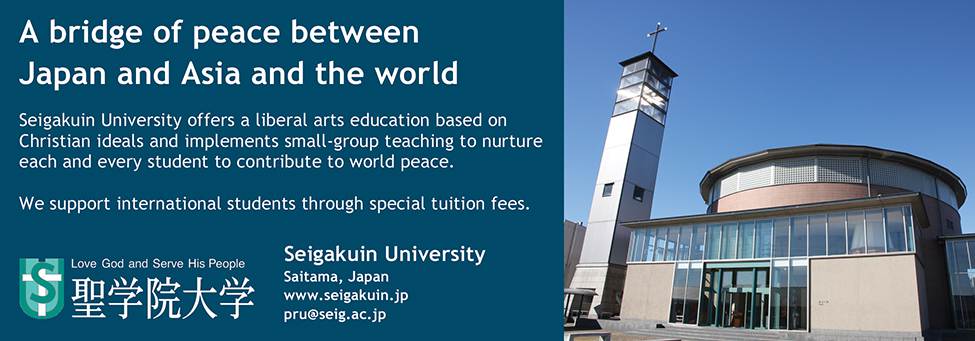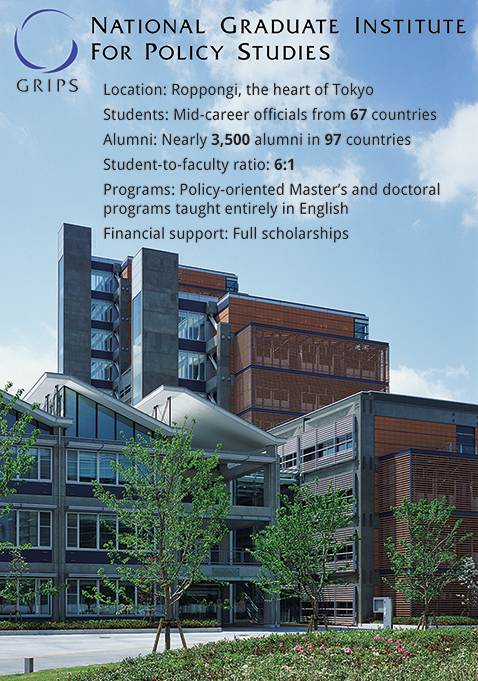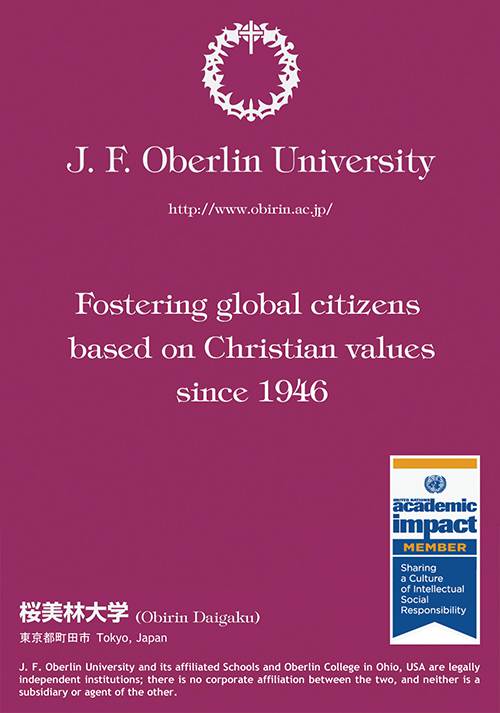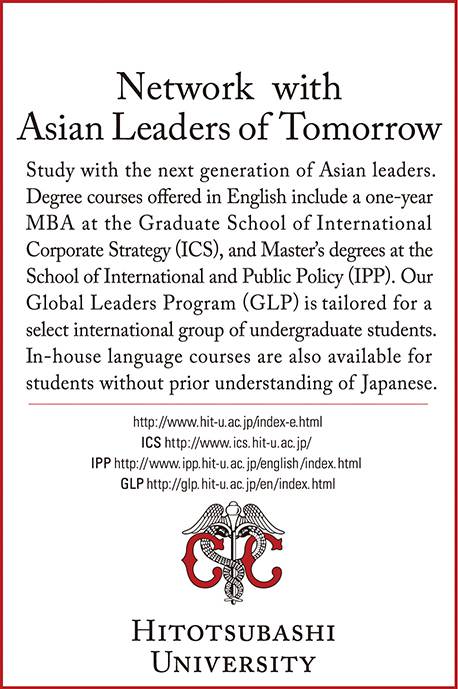Attracted by Japan’s astounding success in global business and by its reputation for technological innovation, a growing number of foreign students apply to Japanese universities, highly confident they will graduate with a world-class education and practical skills.
“International students account for over 10 percent of the total student population. We have more than 230 international undergraduates and over 440 international graduate students,” said Prof. Susumu Yamauchi, president of Hitotsubashi University.
Other top universities in Japan have more international undergraduates than international graduates. Hitotsubashi takes pride in that unique ratio.
Well known for its programs in business and economics, Hitotsubashi University also pioneered seminar-style teaching in Japan and incorporated both German and Japanese styles in the classroom.
“Hitotsubashi University has a long history of producing leaders of Japanese business, or what we call captains of industry,” Yamauchi said.
“Japanese companies are increasingly interested in hiring international students. We have developed strong career support for international students over the years. And thanks to our reputation in the business sector, companies know Hitotsubashi and our graduates are highly valued,” he added.
Hitotsubashi University also conducts “A Career Seminar,” where different leading business executives gives a lecture at the school every week.
Building a global corporate culture has become a priority for many Japanese-grown companies. While demand for foreign employees is rising, there also is a decline in Japanese students’ desire to study abroad — an issue many universities and members of the business sector are quick to address.
“We created the University Hub Haneda Airport based on the idea that the world is getting more and more international. We must use our position as a central hub to cultivate Japanese youth and pique their interest about other countries, while at the same time bringing people in from other countries to learn about Japan,” said Isao Takashiro, president of Japan Airport Terminal Company.
“We implemented this program last year and have had three academies and one symposium so far. One of the academies was about the creative vision and strategy for the global branding of New York City. We had Willy Wong, who was instrumental in the reconstruction of the city after the 9/11 attacks,” Takashiro recalled.
“We also invited Sri Mulyani Indrawati, the World Bank managing director, to speak to the students and business people at a symposium designated as an official postconference event after the IMF/World Bank Annual Meetings held in Tokyo last year,” he added.
With the emphasis on molding cosmopolitan graduates, universities in Japan have expanded their global network through more exchange programs and international enrollment.
“We have over 500 foreign students at J. F. Oberlin. Almost thirty percent of our graduate students are foreign students. And through our Reconnaissance Japan Program, exchange students can study for one year or for one semester, in English or in Chinese,” said Rev. Dr. Takayasu Mitani, president of J. F. Oberlin.
“We also have a Global Outreach Program open to undergraduates of the College of Arts and Sciences and the College of Business Management,” he added.
J.F. Oberlin offers several unique graduate programs, like the Ph.D. Program in Gerontology, offered only at J.F. Oberlin and in Japan. In addition, the university also conducts distance–learning courses for individuals already in the workforce.
“We are proud of our university’s highly-regarded faculty and world renowned professors. The quality of the courses can compete with foreign universities. This April, we are happy to have begun offering degree courses in English,” Mitani said.
Beyond the high–caliber courses, J.F. Oberlin injects a sense of global purpose in its objective.
“The purpose of higher education is not just to impart knowledge, skills, and techniques, but also to mold students into good citizens. Our aim is to educate students to be well-informed global citizens,” he said.
Sharing those ideals is Prof. Mitsuharu Akudo, the president of Seigakuin University, an undergraduate university founded in 1988. Its graduate school was established in 1996.
“Segakuin wants to be a university that makes a contribution. ‘One for others’ and servant leadership are very important principles that Seigakuin follows,” said Akudo.
“Many universities in Japan emphasize that in order to become an internationally-minded person, you need English. But that is not as important as the ability to understand and feel compassion for others. It is not just learning a foreign language that makes you international,” Akudo stressed.
Seigakuin University prides itself in providing transformative education that stresses cooperation over competition.
Admittedly a small university, Seigakuin believes that, more than size, the value placed on empathy and respect toward the learning process allows a university to thrive in our increasingly global community.
While students gain from Japan’s inimitable mix of local culture and international environment, they also benefit from the country’s success as one of Asia’s economic powerhouses.
Opened in 1997, the National Graduate Institute for Policy Studies (GRIPS) in Tokyo provides an opportunity for mid-career officials from around the region and the world to learn about public–policy issues, while equipping themselves to become leaders in their own countries.
“Many students here are sent by their respective governments. They are highly motivated and destined to be senior officials in due course. Experience tells me that our students are on the path to becoming directors-general, members of the board of central banks, ministers, and vice-ministers. They will rise very high,” said Dr. Takashi Shiraishi, president of GRIPS.
Graduate schools like GRIPS and various universities in Japan have formed the country’s and the region’s future leaders in business and government.“GRIPS is the most internationalized graduate university in Japan. Here, you learn not only about Japanese policy issues but also about other countries in the region. I’m hoping to provide the space and time for international or transnational collaboration on policy studies, particularly for our faculty,” he added.
As an example of development for emerging economies, and with its emphasis on a global mindset and international environment, Japan will surely remain a preferred destination for education.
- This Special Report on Japan originally appeared in the July/August 2013 edition of Foreign Affairs (Credit: Janine Ramirez)












